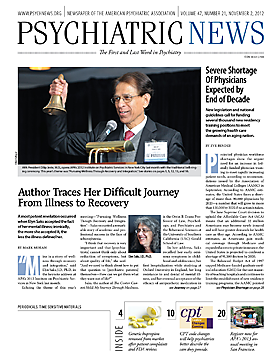Last month the U.S. Supreme Court heard oral arguments in a case brought against the University of Texas at Austin by Abigail Fisher, a white student who charges that she was denied admission to the school in 2008 as the result of an applicant-review process that places undue emphasis on racial considerations.
Two months prior to the hearing, APA signed onto an amicus brief filed by the Association of American Medical Colleges (AAMC) expressing concern that the quality of public health would suffer greatly from any alterations to admissions policies at institutions of higher learning.
“In joining the brief, APA has underscored its belief that a diverse medical—including psychiatric—workforce is essential to meeting the nation’s health needs, and that medical schools and training programs need the discretion to consider applicants’ backgrounds along with their accomplishments,” Paul Appelbaum, M.D., told Psychiatric News. Appelbaum is the Dollard Professor of Psychiatry, Medicine, and Law at Columbia University; chair of APA’s Committee on Judicial Action; and a past APA president.
The University of Texas at Austin maintains a program under which automatic admission is granted to in-state students graduating in the top 10 percent of their high school class. The remaining applicants, of whom Fisher was one, are evaluated through a “holistic” review process that considers a range of nonacademic factors, including racial background.
But while Fisher argued that the university’s Top Ten Percent Plan guarantees a sufficiently diverse student body, the AAMC, APA, and the 28 other health-related professional organizations cosigning the brief countered that the admissions approach “achieves a degree of diversity only because of underlying residential segregation in Texas.”
Also, unlike UT Austin, the cosigners noted, most schools have no effective substitute for considering an applicant’s racial identity and ethnic background as part of a holistic review designed to ensure diversity.
“Medical educators continue to find that a deliberate focus on fostering diversity in medical education is essential if medical schools are to fulfill their responsibility to effectively serve all of society,” the brief stated. “It is hoped that such actions will no longer be necessary in the future, but that future has not yet arrived.”
The cosigners argued that educating medical school students in a diverse environment produces a “culturally competent” workforce capable of identifying, respecting, and addressing differences in patients’ values, preferences, and expressed needs.
“A diverse student body can have a lasting impact on the way that physicians and other health care professionals will serve the public in the future,” the brief asserted.
This case marks the first time in nearly 10 years that the high court has considered the issue of affirmative action as it relates to higher-education admissions. In 2003, the court upheld the University of Michigan Law School’s affirmative action admissions policy in Grutter v. Bollinger, a case in which APA also signed onto an amicus brief in support of the respondent.
Unlike in that earlier case, however, a Supreme Court composed of a majority of conservative judges will make the decision in
Fisher v. University of Texas. Earlier this year, the
Washington Post noted that Obama appointee Justice Elena Kagan recused herself from the case likely due to her earlier involvement in the issue while serving as U.S. solicitor general.

